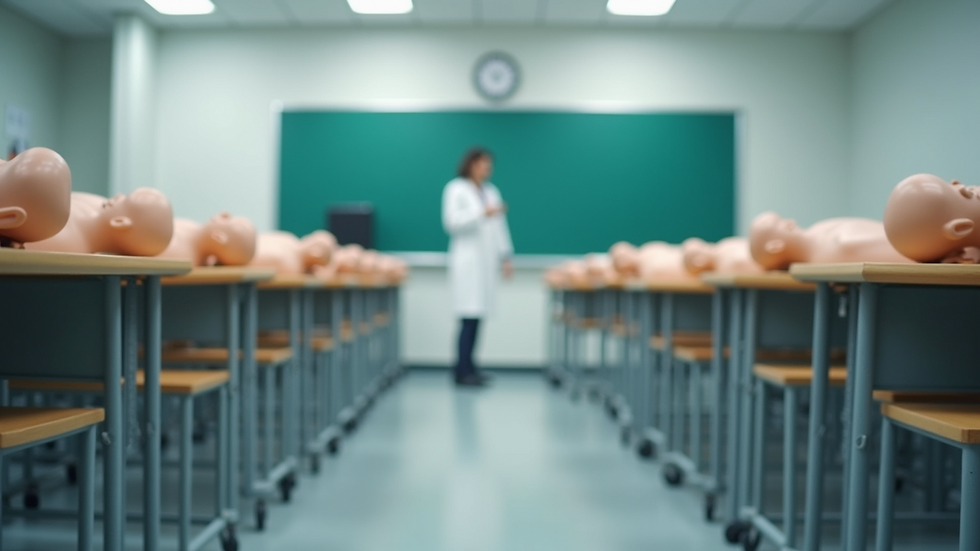CPR AED | Star of ‘The Goldbergs’ spoofs Oscar mixup in CPR video
- May 3, 2020
- 2 min read

Actress Wendi McLendon-Covey can add another role to her credits: Future life-saver.
McLendon-Covey, the family matriarch in ABC’s hit comedy, “The Goldbergs,” stars in the new Hands-Only CPR training video from the American Heart Association that spoofs the mix up that occurred at the end of the Oscars ceremony in February.
The video titled, “The Mix-Up,” is filled with references to the award show blunder with McLendon-Covey ultimately demonstrating the two steps of Hands-Only CPR.
“While the rather unfortunate mishap during this year’s major awards show [shockingly] didn’t result in cardiac arrest, if it had, we’d be prepared!” McLendon-Covey said in a press release.“But in all seriousness, we’re taking a memorable event in pop culture history, and using it to quite literally save lives.
With Hands-Only CPR, I feel empowered to help a cardiac arrest victim if I’m ever put in this situation. I can’t believe how easy it was to learn, and now I know a life-saving skill—and you can too!”
Emmy-nominated screenwriter and filmmaker Andy Tennant, whose film credits include “Hitch“ and “Sweet Home Alabama,” directed the video, which is supported by the Anthem Foundation. Academy Award-nominated producer James Keach, whose film credits include “Walk the Line” and “I’ll Be Me” in conjunction with CK&D media, produced the spot.
Hands-Only CPR has two steps: When you see a teen or adult suddenly collapse, call 911. Then, push hard and fast in the center of the chest until help arrives.
More than 350,000 cardiac arrests occur outside of the hospital setting each year. Hands-Only CPR has been shown to be as effective as conventional CPR for cardiac arrest when it occurs to adults at home, at work or in public. It can double or triple a victim’s chance of survival.
Seventy percent of all out-of-hospital cardiac arrests occur at home. However, the likelihood that a family member or loved one will perform CPR on a person who has cardiac arrest at home decreases with the victim’s age, according to a recent study in the Journal of the American Heart Association. The same study also found that CPR training and knowledge is lower among older adults, who are more likely to experience a cardiac arrest outside a hospital setting.
“The study’s findings should serve as a call to action that we need to increase bystander CPR training that will instill confidence in people to act when somebody they love or know has a cardiac arrest,” said Benjamin S. Abella, M.D. Mphil, the study’s senior author and director of Penn Medicine’s Center for Resuscitation Science. “The new AHA Hands-Only CPR video is an entertaining and creative way to capture the attention of Americans and teach an important skill that can save lives.”
Learn more about CPR AED. Bergenfield, NJ, Jersey City, NJ, Livingston, NJ, Queens, New York.
Source: newsarchive.heart.org





AV在线看 AV在线看;
自拍流出 自拍流出;
国产视频 国产视频;
日本无码 日本无码;
动漫肉番 动漫肉番;
吃瓜专区 吃瓜专区;
SM调教 SM调教;
ASMR ASMR;
国产探花 国产探花;
强奸乱伦 强奸乱伦;
代发外链 提权重点击找我;
蜘蛛池 蜘蛛池;
谷歌马甲包/ 谷歌马甲包;
谷歌霸屏 谷歌霸屏;
谷歌霸屏 谷歌霸屏
蜘蛛池 蜘蛛池
谷歌快排 谷歌快排
Google外链 Google外链
谷歌留痕 谷歌留痕
Gái Gọi…
Gái Gọi…
Dịch Vụ…
谷歌霸屏 谷歌霸屏
负面删除 负面删除
币圈推广 币圈推广
Google权重提升 Google权重提升
Google外链 Google外链
google留痕 google留痕
代发外链 提权重点击找我;
游戏推广 游戏推广;
Fortune Tiger Fortune Tiger;
Fortune Tiger Slots Fortune…
谷歌马甲包/ 谷歌马甲包;
谷歌霸屏 谷歌霸屏;
מכונות ETPU מכונות ETPU;
;ماكينات اي تي بي…
آلات إي بي بي…
ETPU maşınları ETPU maşınları;
ETPUマシン ETPUマシン;
ETPU 기계 ETPU 기계;
google seo google seo技术飞机TG-cheng716051;
03topgame 03topgame
gamesimes gamesimes;
Fortune Tiger Fortune Tiger;
Fortune Tiger Slots Fortune Tiger…
Fortune Tiger Fortune Tiger;
EPS машины EPS машины;
Fortune Tiger Fortune Tiger;
EPS Machine EPS Cutting Machine;
EPS Machine EPS and EPP…
EPP Machine EPP Shape Moulding…
EPS Machine EPS and EPP…
EPTU Machine ETPU Moulding Machine
EPS Machine EPS Cutting Machine;
google seo google seo技术飞机TG-cheng716051;
03topgame 03topgame
gamesimes gamesimes;
Fortune Tiger Fortune Tiger;
Fortune Tiger Slots Fortune Tiger…
Fortune Tiger Fortune Tiger;
EPS машины EPS машины;
Fortune Tiger Fortune Tiger;
EPS Machine EPS Cutting Machine;
EPS Machine EPS and EPP…
EPP Machine EPP Shape Moulding…
EPS Machine EPS and EPP…
EPTU Machine ETPU Moulding Machine
EPS Machine EPS Cutting Machine;